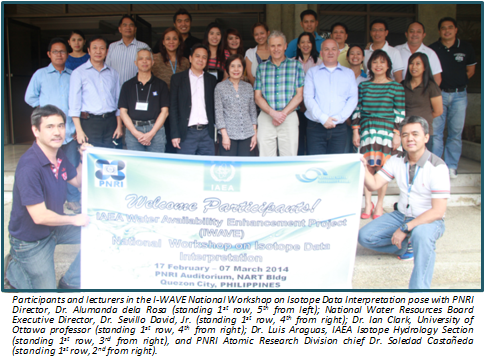
Taking another step in supporting water agencies to provide our country with better access to water resources, the Philippine Nuclear Research Institute hosted the National Workshop on Isotope Data Interpretation under the International Atomic Energy Agency – Water Availability Enhancement (I-WAVE) Project from February 17 to March 7, 2014.
Renowned experts in the field of isotope hydrology served as resource persons for the training workshop. Among them are Dr. Bhishm Kumar, Dr. Matsumoto Takuya, and Dr. Luis Araguas of the IAEA Isotope Hydrology Section; Prof. Jeffrey McDonnell, University of Aberdeen, School Geosciences, Aberdeen, UK; Prof. Neil Sturchio, Department of Earth and Environmental Sciences, University of Illinois, Chicago, USA, and Prof. Ian Clark, Department of Earth Sciences, University of Ottawa, Canada. They provided lectures on the principles of isotope techniques application related to groundwater assessment and groundwater dynamics and facilitated hands-on training on the use of software for groundwater dating. Moreover, through their expert guidance, they engaged the participants in the processing of past and present isotope, chemical and hydrogeological data and in the interpretation of these data to come up with conceptual models of the recharge in their respective study areas.
Participants in the three-week workshop were professionals in groundwater management and the water supply industry coming from various government agencies such as the National Water Resources Board, Local Water Utilities Administration, Bureau of Soils and Water Management, Mines and Geosciences Bureau and representatives from water districts in Regions 2 and 10. The water districts represented were the Metropolitan Tuguegarao Water District and Ilagan City Water Disctrict in , and Cagayan de Oro Water District, Butuan Water District and Manolo Fortich Water District in Region 10.
Dr. Soledad Castañeda, who heads PNRI’s Atomic Research Division, was the workshop’s Course Coordinator. PNRI researchers also participated in the training course. At the culmination of the workshop, the participants realized the importance of nuclear techniques in mapping surface and groundwater sources and in the assessment of vulnerability to contamination to improve the freshwater supply throughout the archipelago.
Contributing to the United Nation’s Millennium Development Goal of halving the number of people worldwide without access to clean drinking water and basic sanitation by 2015, I-WAVE aims to make freshwater more available to the IAEA member states, with an emphasis on groundwater supply.
The Philippines is one of the pilot countries for the I-WAVE project along with Sultanate of Oman and Costa Rica.












































